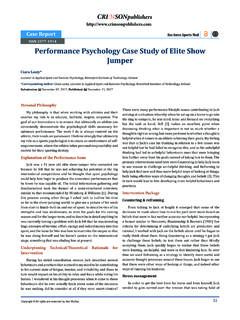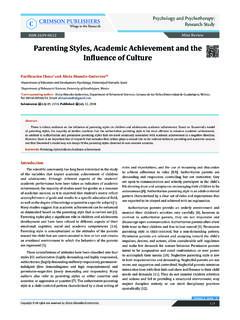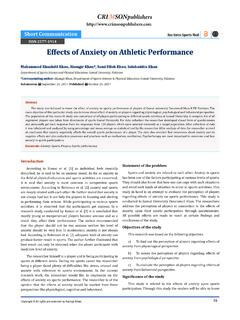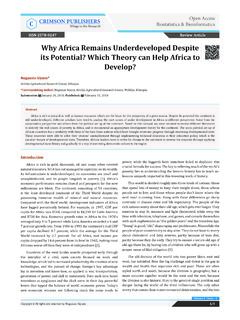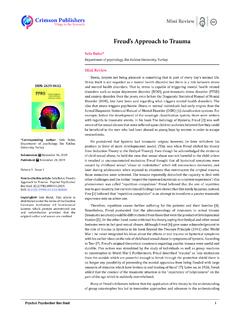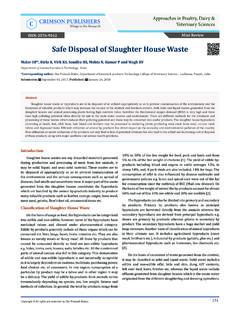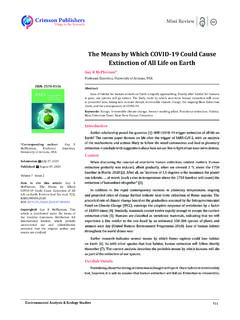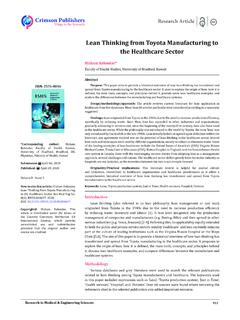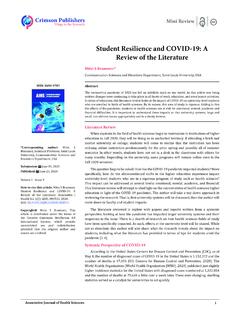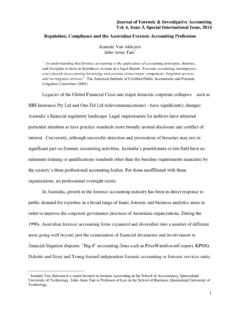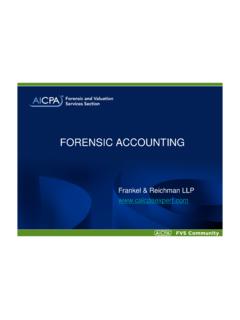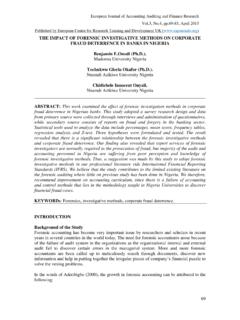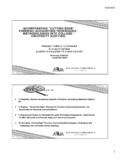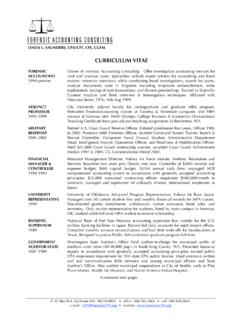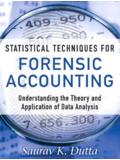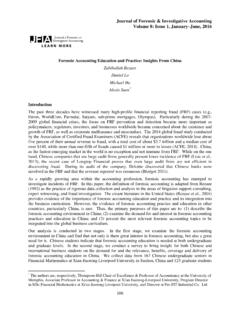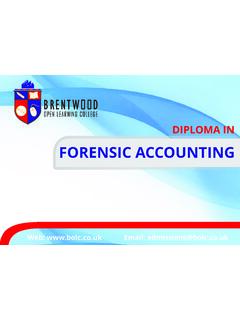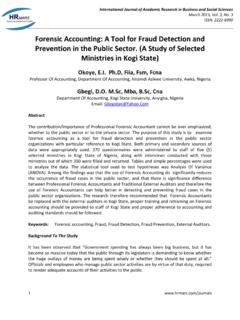Transcription of Forensic Accounting and Fraud Prevention and Detection in ...
1 Forensic Accounting and Fraud Prevention and Detection in Nigerian Banking IndustryIntroductionThe Nigeria banking sector is composed of deposit money banks, development banks, merchant banks and the Central Bank of Nigeria (CBN), which is the apex bank. The apex bank is charged with the responsibility of administering the Banks and Other Financial Institutions (BOFIA) Act 1991 as amended, with the sole aim of ensuring high standard of banking practice and financial stability through its surveillance activities as well as the promotion of an efficient payment system, [1]. Among the Nigerian Industrial sectors today, one can say that the banking industry is the most visible and arouses the most public interest. According to Adeyemo [2], the banking sector plays a vital role of provision of an efficient payment system, financial intermediation and facilitation of the implementation of monetary policies.
2 Banks have been identified as an engine of growth in the economy because they perform resource allocation function by mobilizing and channeling resources from surplus economic unit to deficit unit. The relevance of banks in the economy of any nation cannot be overemphasized. They are the cornerstones, the linchpin of the economy of every country. Consequently, it is submitted that the economic well-being of a nation is a function of advancement and development of her banking today s Nigeria banking sector, hundreds of Billions of Naira get squandered yearly due to bank Fraud [2]. The incidence of Fraud continues to increase across the banking sector and across nations, and controlling Fraud in the banking sector is a major task for all the stake holders in the sector. Fraud is a universal problem as no nation is immuned, though developing countries like Nigeria and their various states suffer the most pain. Although the incidence of Fraud is neither limited to the banking industry nor to the Nigerian economy, high rates of Fraud within the banking industry calls for urgent attention with a view to finding lasting solutions.
3 The involvement of the banking industry in Nigeria has brought about loss of confidence among the banking public and impeded the going concern status of several banks in the country. The Association of Certified Fraud Examiners [3] defines Fraud as any illegal acts characterized by deceit, concealment or violation of trust. These acts are not dependent on the application of threat of violence or of physical force .Despite the establishment of anti- Fraud agencies like Economic and Financial Crimes Commission (EFCC) and Independent Corrupt Practices Commission (ICPC), cases of Fraud practices in the banking sector appears to be on the increase and it seems difficult Research Article1/8 Copyright All rights are reserved by Okere - 1 Issue - 1 Ogundana Oyebisi, Okere Wisdom*, Ogunleye Olusogo and Oladapo IfeoluwaDepartment of Accounting , Bells University of Technology, Nigeria*Corresponding author: Okere Wisdom, Department of Accounting , Bells University of Technology, Ota, Ogun State, NigeriaSubmission: May 21, 2018; Published: May 31, 2018 AbstractThis study examined the role of the Forensic accountant in the Prevention and Detection of Fraud in the Nigeria banking sector.
4 The study adopted the Survey research design while the source of data is the primary data and the data sourced was gleened from copies of the questionnaire administered to selected banks. Three (3) hypotheses were formulated and tested using Simple regression at a significant level of 5%, Independent T-test and One-way Anova. Findings revealed a negative significant relationship between IFRS adoption and foreign direct investment of Nigeria banks. Findings also revealed that between Forensic Accounting has a significant impact on Fraud Prevention and Detection . In addition, the findings of this study also revealed that there is a low level of the awareness of Forensic Accounting in the Nigeria banking industry. Consequently, the study recommended that Nigerian Government should provide the enabling environment for Forensic Accounting profession to thrive in the country by strengthening the legal, educational and political frame work in the : Auditing; Detection ; Fraud ; Forensic ; Prevention ; InvestigationAbbreviations: CBN: Central Bank of Nigeria; BOFIA: Banks and Other Financial Institutions; EFCC: Economic and Financial Crimes Commission; ICPC: Independent Corrupt Practices Commission; GAAP: Generally Accepted Accounting Principles; OLS: Ordinary Least Square Regression; SPSS: Statistical Package for Social Sciences; NUC: National Universities Commission; ICAN: Institute of Chartered Accountants of NigeriaCOJ Reviews & ResearchCCRIMSON PUBLISHERSW ings to the ResearchISSN 2639-0590 COJ Rev & Res Copyright Okere Wisdom2/8 How to cite this article: Ogundana O, Okere W, Ogunleye O, Oladapo I.
5 Forensic Accounting and Fraud Prevention and Detection in Nigerian Banking Industry. COJ Rev & Res. 1(1). DOI: - 1 Issue - 1for these anti- Fraud agencies to successfully prosecute many of the alleged cases of Fraud involving billions of naira. Most of these fraudulent practices are perpetrated by highly skilled fraudsters, employing sophisticated methods, thus requiring highly skilled and capable individuals to undo the fraudulent schemes. There is a need to respond to this criminal threat and the skill of non-traditional investigator like accountant and legal expertise are needed to combat these corporate ills by highly skilled fraudsters. The failure of statutory audit to prevent and reduce misappropriation of corporate fund and prevent increase in corporate crime has put pressure on the professional accountant and legal practitioner to find a better way of minimizing Fraud in banking industry.
6 This is where the role of Forensic Accounting in Fraud Prevention and Detection comes in to bridge the gap in banking sector in other to curb financial Accounting according to Crumbley et al. [4] is the action of identifying, recording, settling, extracting, sorting, reporting and verifying past financial data or other Accounting activities, for settling current or prospective legal disputes, or using such past financial data for projecting future financial data to settle legal disputes. It utilizes Accounting , auditing and investigative skills when conducting any kind of investigation. This study therefore examines the role of the Forensic Accountants in the Prevention and Detection of Fraud in the Nigeria banking industry. The rest of this study is divided as follows: Section 2 contains the review of extant literature. Section 3 contains the research methods of the study. Section 4 reveals the analysis of the result while Section 5 conclusion and recommendation of the research study.
7 Literature ReviewConcept of Forensic accountingAccounting today is called the language of business this is so because it is the vehicle for reporting financial information about a business entity to many different groups of people. There are different branches of Accounting . The branch of Accounting that concentrates on reporting to people inside the business entity is called management Accounting . It is used to provide information to employees, managers, owner-managers and auditors. Management Accounting is concerned primarily with providing a basis for making management or operating decisions. Accounting that provides information to people outside the business entity is called financial Accounting . It provides information to present and potential shareholders, creditors such as banks or vendors, financial analysts, economists, and government agencies. Because these users have different needs, the presentation of financial accounts is very structured and subject to many more rules than management Accounting .
8 The body of rules that governs financial Accounting is called Generally Accepted Accounting Principles (GAAP) [5]. Forensic Accounting also called investigative Accounting or Fraud audit is a merger of Forensic science and Accounting [6]. Forensic science, as Crumbley [7] put it may be defined as application of laws of nature to the laws of man. A Forensic scientist is one who examines and interprets evidence and facts in legal cases and also offers expert opinions regarding their findings in the court of law. In the present context, the science is Accounting , hence the examination and interpretation will be of economic financial information. According to Bologna et al. [8], Forensic and investigative Accounting is the use of financial skills and investigative mentality to unresolved issues, applied within the context of the rules of evidence. Zysman [9] defined Forensic Accounting as integration of Accounting , auditing and investigative skills.
9 Other definitions have been given by Joshi [10], Mehta et al. [11] and Crumbley [12]. Coenen [13] avers that Forensic Accounting uses Accounting concepts and techniques in solving legal problems. Evazzadeh et al. [14] consider Forensic Accounting as a specialized field in Accounting frequently concerned with legal problems and , there is no generally acceptable definition of Forensic Accounting . There may be so many definitions of Forensic Accounting as there are authors. But the Association of Certified Fraud Examiners [3] defined Forensic Accounting as the use of skills in potential or real civil or criminal disputes, including generally accepted Accounting and auditing principles in establishing losses of profit, income, property or damage, estimations of internal controls, frauds and others that involve inclusion of Accounting expertise into the legal system . Hence, Forensic Accounting involves the application of Accounting concepts, auditing techniques and investigative procedures in solving legal problems.
10 Be that as it may, it should be noted here that the responsibility of preventing and detecting Fraud in financial statements lies not only in the hands of management of an enterprise, but also other control institutions and mechanisms. System of internal control, internal auditing and audit committee are the key elements for Prevention and Detection of frauds that are created through property misuse as well as those that use financial statements as instruments of frauds. But external auditing and Forensic Accounting perform retrospective control of financial data with the aim of detecting omissions, frauds and securing the reliability and credibility of financial statements. Krsti [15] has noted that it is now being considered as a generally accepted objective for business activity to secure reliable financial information through disclosing financial statements. Numerous financial frauds have seriously disrupted the trust of many users of financial information contained in financial statements.
